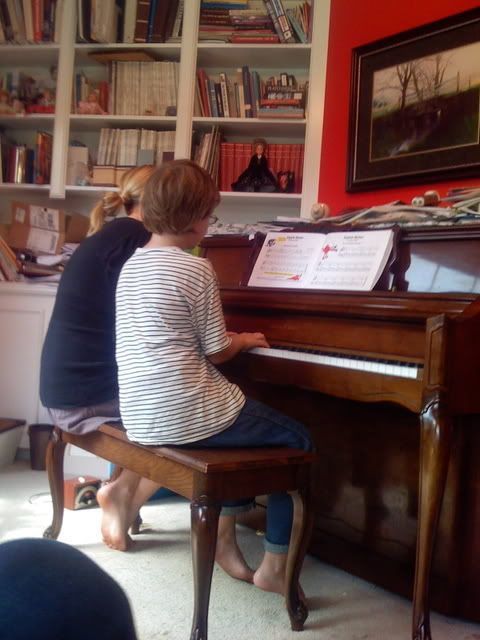Is Your Family Ready for HomeSchooling?By
Cheryl DixonMore parents are deciding to homeschool their children each year. As early as the late 1960's homeschooling increased from 10,000 to 15,000 children. In 1999 the number of homeschooled children had risen to 850,000, and by 2003 the number jumped to 1.1 million children which represents a 29 percent relative increase over the 4-year period.
 Photo: onenewsnow.com
Photo: onenewsnow.comStudents are considered to be homeschooled if their parents reported them as being schooled at home instead of at a public or private school for at least part of their education and if their part-time enrollment in public or private schools did not exceed 25 hours a week. Students who were schooled at home only because of a temporary illness were not included as homeschoolers.
Most Important Reasons for HomeschoolingThirty-one percent of homeschoolers had parents who said the most important reason for homeschooling was concern about the environment of other schools.
Thirty percent said the most important reason was to provide religious or moral instruction.
Sixteen percent of homeschooled students had parents who said dissatisfaction with the academic instruction available at other schools was their most important reason for homeschooling.
Families that elect to educate their children at home come from all major ethnic, cultural, and religious backgrounds, and all income levels. However, homeschoolers are more likely to be religious, conservative, white, better educated, and part of a two-parent family, compared with the average American family. Homeschooling families tend to have more children and be middle-class.
Parents who homeschool their children are more likely to vote, contribute money to political causes, contact elected officials about their views, attend public meetings or rallies, or join community and volunteer associations. This holds true even when researchers compare only families with similar characteristics, including education, income, age, race, family structure, geographic region, and number of hours worked per week.
What Resources Do Homeschooling Families Use?
Parents are, of course, the primary resource. Typically, the mother takes the lead, though fathers usually pitch in. Perhaps as many as one out of ten fathers takes the primary responsibility.
How Well Do Homeschoolers Perform Academically and Socially?
Researchers cannot tell whether the same children would perform better or worse academically in a classroom or at home. State testing data does not necessarily reflect all homeschoolers because not all comply with the testing requirement. Other testing efforts rely on volunteers.
Keeping that caveat in mind, where testing data is available, homeschoolers do well. For example, in Alaska, the state's Alyeska Central School has tested its homeschooling children for several decades. As a group they usually score above average in any subject area and at all grade levels. The largest study to date, commissioned by the Home School Legal Defense Association, involved 12,000 students tested through the Bob Jones University testing services. The homeschooled children placed in the 62nd to the 91st percentile of national norms, depending on grade level and subject area.
At least one intriguing study suggests that student achievement for homeschoolers is not related to the educational attainment of the parent. This is consistent with tutoring studies that suggest the education level of a tutor has little to do with achievement of a tutored child.
College admission also may suggest success. Homeschoolers have reported admission to over 1,000 different U.S. colleges and universities.
People disagree about whether homeschooling helps or hinders a child's social development. Homeschooling children spend less time with peers and more time with people of different ages. Most participate in scouting, church groups, and other associations. Many volunteer in their communities. Some operate a business. There is no conclusive research suggesting that additional time with same-aged peers is preferable to more time with individuals of varying ages.
What Is the Legal Status of Homeschooling?
Today homeschooling is legal in all states. State law generally requires homeschooling parents to file basic information with either the state or local education agency. Over half the states require some kind of evaluation under some or all of the homeschooling options available under state law. Usually, this evaluation involves testing of students, but some states accept portfolio evaluations or a teacher evaluation. Much less frequently, states have education or testing requirements for parents. Some states require submission of a curricular plan. Parents do not need teaching certificates.
Public programs are growing. Alaska sponsors the Alyeska Central School, where teachers in Juneau work with students all over the state via mail, the Internet, telephone, and occasional home visits. In California, children can enroll in a public school's independent-study program. Washington and Iowa laws require public schools to admit students part-time. Some public schools offer specialized homeschooling centers where families may obtain resources and instructional support, or where children may take classes. An estimated 18 percent of children who are homeschooled enroll in school part-time; 5 percent enroll for 9 or more hours per week
Local and state support groups offer advice and assistance. Sometimes, several families will share instructional duties. Local support groups form readily if there are a sufficient number of homeschooling families in an area. There is at least one state-level homeschooling association in every state, and in some states there are a dozen or more regional associations. Often, parents may examine instructional materials at a book fair or association meeting.
Other popular resources include libraries, museums, colleges, parks departments, churches, local businesses, and schools. Many large and small publishers offer curricular packages, books, periodicals, and other materials for use in home instruction.
Cheryl Dixon has recently published an in-depth report on home schooling, you can read an overview here:
http://www.millmarkbiz.com/hhs.htm and is the publisher of the Goal Mine Gazette weekly newsletter, you can subscribe here:
http://www.millmarkbiz.com/sub.htm





